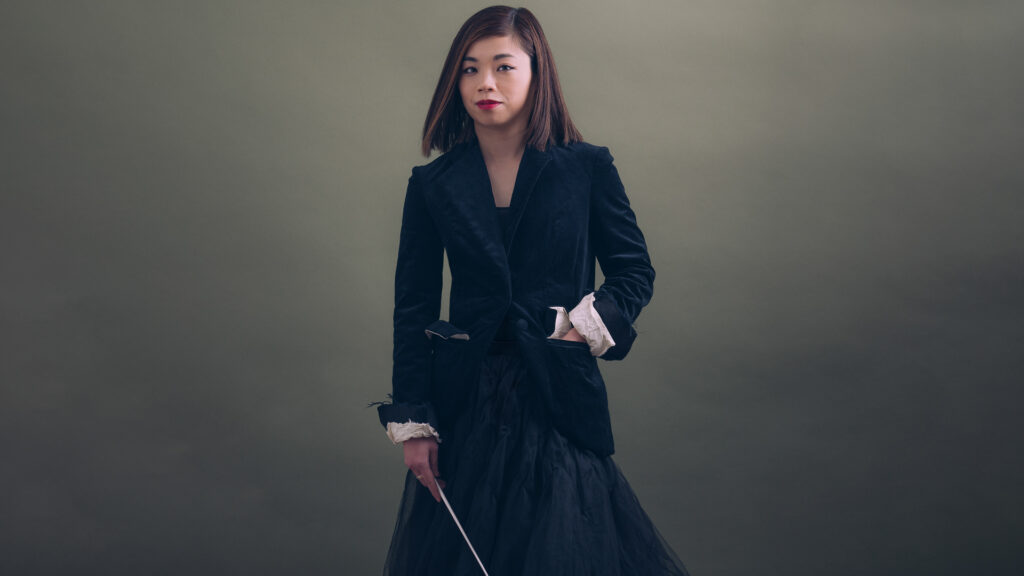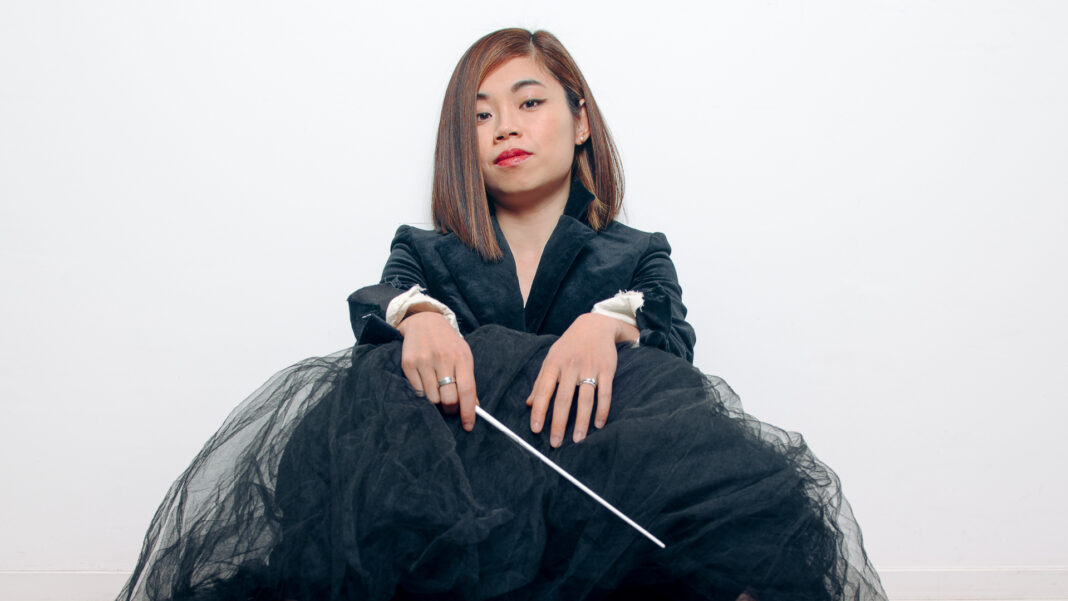
Conductor Elim Chan has had remarkable success since being named the first woman to win the Donatella Flick Conducting competition ten years ago. This month Chan is realizing two big dreams: to open the classical music season at the Hollywood Bowl and to conduct the First Night of the Proms in London at Royal Albert Hall. Not too bad for a young girl who years ago was inspired by Mickey Mouse in Fantasia.
The July 9th concert at the Hollywood Bowl finds Chan conducting the same piece that led to her winning the Donatella Flick LSO Conducting Competition: Rimsky-Korsakov’s Scheherazade. The July 19th First Night of the Proms concert will open with Handel’s Music for the Royal Fireworks Overture and close with Beethoven’s Symphony No. 5.
Earlier this week I spoke with Chan about these two concerts and what they mean to her, her evolving relationship with Scheherazade and what new dreams she has as she moves forward with her career.
What follows are excerpts from our conversation that have been edited for length and clarity. To see the full interview with Chan, please go to our YouTube channel.
Q: Could the young girl who responded so passionately to the image of Mickey Mouse conducting in Fantasia have ever imagined these two big concerts for herself?
Absolutely not. Even though as a young girl I think I had quite a crazy imagination. Of course I have dreams. But this kind of dream, the Hollywood Bowl, it’s already very cool. And to think I’m going to start the classical season! Then the Proms is basically like a unicorn. To conduct the Proms on the first night – the biggest summer festival in the UK and famous one in the world? It’s more than a dream come true.
What was your first experience conducting the Proms, and how do you think this one will be different?
The first time that I conducted the Proms was an amazing experience because the Royal Albert Hall, it’s a very different concert hall. You really feel that you’re in sort of like a stadium. You have the audience standing at your feet and you can literally touch them or they can touch you. The feeling of how the audience cheered for you and they really are so involved. That’s really quite something I never experienced anywhere else. That was such a huge honor. I felt like a rock star.
To know that this concert was like one of the first ones to be sold out; the tickets were gone the moment it went out there. I don’t know, I’m going to just stay open and let this just be a surprise.
We often hear about how conductors think about music. What do you think is unique about the way you hear music – whether you’re reading a score or when you’re conducting an orchestra?
I think that’s a very interesting question. Conducting is so cool in the sense that I have this concept in my head, this story, a narrative or some sort of sound soundscape the moment I start opening a score. It starts. I can hear it. I can play it on the piano and then it builds this world that I’m hearing or envisioning.

When I’m on stage with the orchestra, I have to compare what I’m hearing with this vision in my head and then have to bring it closer. Sometimes, actually, what I’m hearing is nicer than what I thought. It’s like a constant synergy of both worlds. It’s, in a way, like a tango, right? Of course, I’m the conductor and I want to mold it in the end that we arrive at the vision that we’re all happy about.
I interviewed conductor Simone Young four years ago, and she told me that, “Everything comes from the written page. I spend hours and hours studying scores, but also studying manuscripts. References. I want to get as much info about the thought process and the work process.” Do you think there can be a definitive understanding of a composer’s thought process? Or will it always be open to interpretation?
I think the second. I also do the same. I want to really put myself back in the time, in the context. This is really, I feel, like investigative work. There’s like a crime scene. Something happened. Okay, what really happened? You can collect evidence. You can talk to people who think they saw the thing happened. But each perspective is different. Then collecting all these things and then I try to build an interpretation of what exactly happened because no one actually really knows. And I think this is so cool. That’s the beauty of it, that there’s really not one right way. We’re all interpreters in that sense.
At the Proms, you’re going to be conducting probably one of the top five best known compositions in the history of the world: Beethoven’s Fifth. With a work so familiar to audiences and so familiar to the musicians, how do you think your approach to it might be the only one that you, as an individual, could have imagined?
Well, there’s only one Elim, right? In that sense. It will be my interpretation of it. One thing that came out from this whole crazy time, and we’re still in some crazy times, is that I really want to give this life experience to everyone who is there. That you need to be there to experience that because it only happens once.
Beethoven Five is so familiar. And the audience thinks they know, too. The world is so messed up with wars happening everywhere and we get to make music and to celebrate first night of the Proms. The beginning of Beethoven Five is like a moment to really express something that fuels it to become a Beethoven Five that is fresh and happening now.
How often do you surprise yourself in the middle of a concert?
A lot. I laugh actually when mistakes happen because that shocks everyone. I love those very raw like a minute or two and everyone is like, wait, what? Oh no. And everyone’s awareness is insane, right? I love these waking up moments.
That sounds like a jazz musician, not a classical musician. Because a jazz musician moves past the mistakes and who knows where it leads them? I bring that up because I was very surprised to see a list of the five most important works for you and Bill Evans is on your list. What inspires you most about Bill Evans and do you see a way in which the way Bill Evans created and performed music that inspires the way you create and perform music?
He’s such an immense pianist and musician and it’s not ever the same. This is something I really want to take into a Beethoven Five or a Clara Schumann or Handel, Bruckner. I’m going to just take this opportunity and just really bring in that spirit. I think we can learn so much from all the other genres.
Note: First Night of the Proms includes performances of Clara Schumann’s Piano Concerto by Isata Kanneh-Mason and Bruckner’s Psalm.
You’ll be leading the Los Angeles Philharmonic at the Hollywood Bowl. Music director Gustavo Dudamel is set to leave soon. if the L.A. Philharmonic came to you and asked if you would like to be the next music director, what would be the first thing that you would think?
That’s another unicorn. And then I’ll start doing a happy dance. I will probably be like, unbelievable. You know what? If that happens…thank you and let’s get to work. I want to be as ready as possible They are one of the most adventurous, curious, orchestras institutions in the world. They take chances, they take risks, and they can afford to do it. So yeah. Let’s see.
At the Hollywood Bowl you will be revisiting Rimsky-Korsakov’s Scheherazade. How was your relationship to this particular composition evolved in the ten years since your winning the Donatella Flick Conducting Competition?
The piece has a very special place in my heart. It’s the piece that jump started my career. Ten years ago I was the first woman to win the competition in London. And now ten years later, I’m still the only woman to have done that. And I’m like, hey girls, where are you guys?
Talking about the piece itself, it’s literally about a woman having to stand up for herself every night telling stories, and if she doesn’t tell a good story, she gets killed. I’ve done this piece again and again and I really feel very like I identify myself with her – Scheherazade. Each time I do the piece I get more brave. I’m more convinced that we really need to be strong. My interpretation is like a steady slow cook. It takes more flavor. Every time I go back to it, I still see something new and I want to try something new so I can tell the story in different ways. I really love the fact that this piece lends itself for that.
Rimsky-Korsakov is quoted as having said, “I had no idea of the historical evolution of the civilized world’s music, and had not realized that all modern music owes everything to Bach.” Do you agree that all modern music, even today, owes everything to Bach?
Wow, what a statement! I think a lot of it, yes. I always believe that we all need to actually understand what happened in the past, especially Bach as such a master. To really understand what the traditions [were] that came before. Then you can decide to keep it or break it. All the greats follow Bach. If you look back, Brahms, Beethoven, everyone basically comes from there.
We started the conversation by my asking you if you could have imagined opening the classical season at the Hollywood Bowl and then opening the BBC Proms in London. That seems like a dream come true. But everybody has to have new dreams as well. What dreams do you have beyond what this July is going to offer you?
My dream is to find an orchestra, a place where we can do some crazy things and grow together, fly together. Another dream of mine actually will come true is that I finally can do some opera. I came from voice choirs and so I love theater, I love drama. So what’s better than actually opera to have all these elements coming together? This is like in two years. There are crazy dreams to conduct the Berlin Philharmonic, the Vienna Philharmonic, all this stuff. Sometimes I put a dream and then things like the First Night of the Proms comes in. So in a way, I’m like, life – come on, surprise me.
To view the full interview with Elim Chan, please go here.
All Photos: Elim Chan (Photo ©Simon Pauly/Courtesy for artists)











